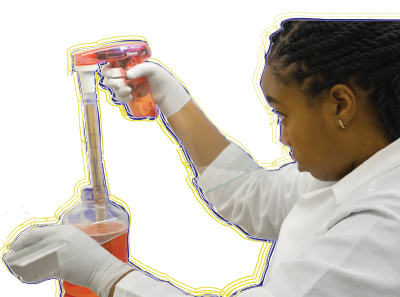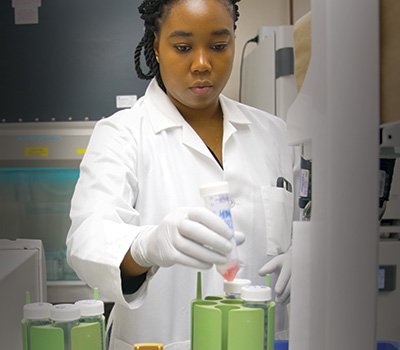

Third-year PhD Student Janelle LeMon has been interested in pathological drivers since she was 16, when she read about how childhood and adolescent behavior can help profile a criminal.

There’s been research done on animal models and other human models—not specific to Black Americans—that shows the stress that the parents have impacts the stress of the offspring. I’m incredibly interested in understanding the epigenetic changes associated with generations upon generations upon generations of early-life adversity and life-long stress and trauma, and how that could be contributing to Black Americans’ predisposition to disease.
— Janelle LeMon
"They’re making these conclusions based on behavior from childhood and how that behavior was maladaptive already and became fixed into adolescence to drive them to commit crimes,” LeMon explains. “And as I got more into looking at personality disorders—the longevity of them and how they’re programmed—it kept coming up, this crossroads of how there may be these genes ‘online’ as a child, but through hormonal programming, as well as environmental factors, things can become suppressed or heightened and lead to differential outcomes of pathology.
“That really stuck with me, and has been driving the decisions I’ve been making in regard to the research I want to do.”
LeMon went on to earn a BS in psychology with a minor in philosophy from the Syracuse University College of Arts and Sciences (’15) and an MA in behavioral neuroscience from the Michigan State University College of Social Science (’17). Now, she’s conducting research with Dr. Adam Moeser, Matilda R. Wilson endowed chair and professor, through the Comparative Medicine and Integrative Biology Program at MSU’s College of Veterinary Medicine.
LeMon’s studying the impacts of early-life adversity (ELA) and how it affects chronic inflammatory disease later in life. Her ultimate goal is to identify a target for which to develop a drug that would lessen or negate ELA’s impact on these diseases—asthma, heart disease, depression, and others—across the lifespan.“We’re focusing on the mast cell because it’s a critical driver of immunity, robustly activated by stress, and programmed during early life,” says LeMon.
LeMon plans to stay in academia to continue her research, not only for scientific discovery, but for social change.
“My interest has always been in the early-life effects of stress, primarily because Black Americans are incredibly susceptible to early-life adversity. That’s independent of education and socioeconomic status of the parents, just for the nature of racism.”
LeMon explains that with Black American history comes generational stress that creates long-term and far-reaching negative health outcomes. “There’s been research done on animal models and other human models—not specific to Black Americans—that shows the stress that the parents have impacts the stress of the offspring. I’m incredibly interested in understanding the epigenetic changes associated with generations upon generations upon generations of early-life adversity and life-long stress and trauma, and how that could be contributing to Black Americans’ predisposition to disease.”Black Americans have higher rates of chronic inflammatory diseases that are specifically associated with ELA, such as stroke, heart disease, diabetes, and depression, among others. This dynamic also is apparent in research; when animals stressed with ELA are fed the same high-fat diet as those without ELA, the animals that experienced ELA develop worse pathologies.
“It’s not just diet, it’s across the board—the literature—early-life adversity causes premature mortality and increases the rate of disease. That’s for almost every disease in which inflammation is included, and that’s pretty much everything.”
LeMon’s career aspirations are more than scientific; she recognizes her value as a role model and plans to capitalize on it.
As an undergraduate student, LeMon studied with Dr. Catherine Cornwell, who is a Black woman and the only person in Syracuse University’s Department of Psychology who conducts psychological research with animal models.
“I had the absolute privilege to work under her and see myself in her position,” says LeMon. “The freedom with which we were able to generate thoughts and ideas and conduct our research without having to think about soft skills or hard skills or tone or whether or not I’m stepping on someone’s toes or why I’m being ignored—the things that speak to my experience as a Black woman in a predominantly white space—it made the science that much easier.”
LeMon sees herself being in that role one day—and she’s well on her way. She has been involved with MSU’s Alliance for the Graduate Professoriate (AGEP) and the Summer Research Opportunities Program (SROP), both of which focus on underrepresented minority students. LeMon has been SROP’s lead graduate facilitator for four years, for which she trains other graduate students to be strong mentors.
Like Cornwell, LeMon intentionally works with Black and brown students, as well as others whose identities are underrepresented. She’s a model of someone not-the-norm thriving and succeeding in academia, while simultaneously challenging students to become better scientists and thinkers. LeMon estimates that she’s worked with hundreds of students, either directly or passively.
“Some of them have gone on to graduate school at MSU, and I see them, and they say, ‘You were my mentor!’ And I’m like, ‘I was?’ I see them graduate and thrive, and it’s a great feeling. It lets me know I can continue to have an impact, and it’s going to be something crucial to my career as an academic scientist.” 
